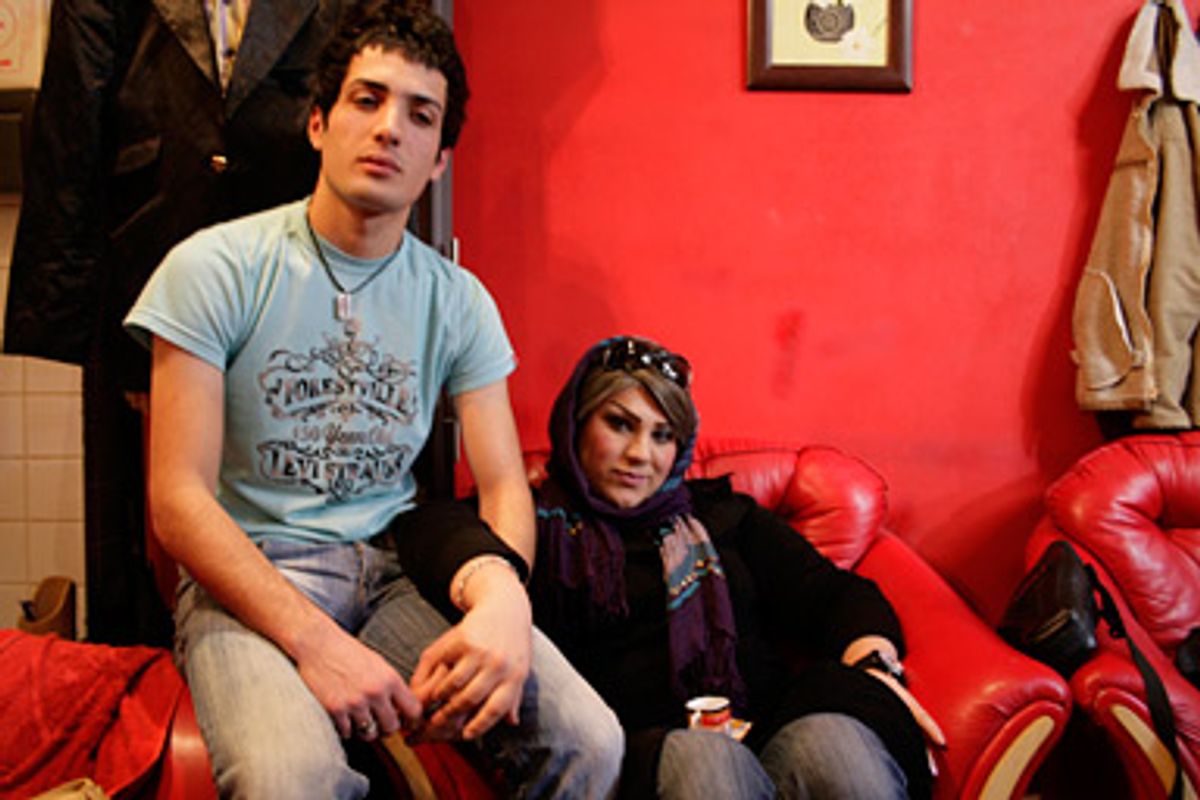
Ali (left) and Anoosh in "Be Like Others."
It is a happy accident that the documentary "Be Like Others" is screening on HBO at exactly the moment so many of us are discovering just how little we know about Iran. Tanaz Eshaghian's documentary tells a complicated and fascinating tale about sexual politics in a country where homosexuality is punishable by death but sex-change operations are legal, even subsidized by the government. Eshaghian introduces us to a handful of men at a Tehran clinic eager to undergo the operation. But a dark question runs through all their interviews: Are these men really transsexual, or has the shame of their culture pushed them into undergoing a radical procedure?
"If I didn't have to operate, I wouldn't do it," says one subject, the 24-year-old Ali Askar, who later goes by the name Negar. "I wouldn't touch God's work." Another subject -- the 21-year-old Anoosh, swooningly in love with a handsome boyfriend (pictured), would prefer to live as a cross-dresser but plows ahead with the surgery in hopes of getting married (which, following the film's release, he does).
Filmmaker Eshaghian was born in Iran but raised in the United States. Her last film, "Love Iranian-American Style," was a familiar and personal tale about her Iranian-Jewish family's obsession to see her hitched. But "Be Like Others" is another beast entirely -- a grim portrait of a population rarely seen.
The documentary screens tonight on HBO at 8 p.m. ET/PT. Salon spoke to Eshaghian by phone.
How did you come to this story?
I had read about Iranian transsexuals in a story in the New York Times. But it wasn't so much that I was interested in transsexuality as I have a belief that you can understand a society by those who live in their margins. It was not, "Look at this oddity." It was more that these may be odd people, but they are human beings in a society that is very traditional and does not tolerate people who aren't.
Many of us in the West may be unfamiliar with the fact that sex changes are permitted in Iran. Can you explain how that came about?
There was a fatwa issued more than 20 years ago by Khomeini wherein he stated that sex changes are a medical condition. And if someone wants to fix themselves to match their bodies, that is allowed under the auspices of a doctor.
But because homosexuality is illegal, one of the tensions of the film becomes -- to what extent is this society pushing people into getting a sex change? What were some of the reasons you heard from men for wanting to get the operation?
They would always say, I feel like I'm trapped in the wrong body. Then you would hear, I am tired of the harassment, of being told I walk funny. I'm not masculine enough. I get harassed for being a degenerate, a sinner. Is their desire for a sex change simply a result of their environment? As with anyone's sexuality, it's impossible for me to tell. That's what I thought was interesting.
But there's also terrible pressure from families not to have these surgeries. Ali Askar says that his father tried to poison him when he announced he was getting the surgery.
It's so shameful if you have a son -- who's supposed to carry on the family honor, behave in a proper masculine fashion -- say that he wants to be a woman. It's unbelievable to the family, and at the same time it's deeply offending to their honor. In America, we're so used to the idea of the individual: What do you want? Here, the individual's wants are not considered. What's a concern is how they might destabilize the community.
So why go through with the surgery?
You reach a point where you're constantly rejected, treated like garbage, and you're desperate. You're looking for something to fix it all. Here you go: We can fix you and cure you. It's a ray of hope. I was told by many transsexuals that suicide is very common. You hear it from Negar (Ali Askar) at the end of the movie. She says it without any emotion: It would be best for everyone if I just die. I will suffer less and be with God.
It does feel like there's no place for them.
There's not a place. And there is this desperate scramble to find a place. I could feel that it wasn't well thought-through. This could work. Let's try this.
Do you think you'll make another movie in Iran?
It depends on how closed the country becomes. I think you'll probably see documentary filmmakers in Iran coming out with things. But I don't think you'll see documentary filmmakers going in. That's what I would predict.
How do you feel about what's going on right now?
Depressed. It's wasted blood. It's tragic. People are going to be so sad for the next 10, 15 years. I think people are going to be crushed. But I don't know. I'm not there.
I've heard that what is going on now in Iran could lead to changes for women in Iran. Because they're fighting alongside men. Because they've been so visible in this fight and critical in this election.
But they always have been fighting alongside men. I don't think it's going to change things for women. Sadly, I think people are going to be really, really kept in their places from now on.

Shares